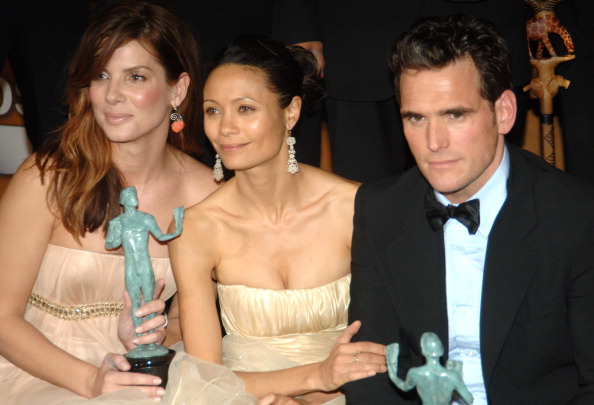
Source: Jeff Kravitz / Getty
We’ve always adored Thandie Newton, even through some of her more questionable career choices — and now she’s actually admitting she has regrets of her own about some of those roles. Newton is holding nothing back in a new interview with Vulture where she talks about being sexually abused by a director while she was still a teenager, offensive experiences and meetings with other Hollywood producers and actors, darkening her skin for roles and gaining a greater context for past parts. It’s a WHOLE lot but we’re excerpting some of the parts we thought our audience would be most interested in.
Thandie on her role as Sally Hemings in ‘Jefferson in Paris’ :
I would definitely approach that film in a completely different way now. I would push for the film to be more about Sally Hemings and Thomas Jefferson. And I think that had the DNA tests been done before the movie, they would have definitely wanted to make it more about that. But it would have turned out to be a horror film, because you can’t not have scenes of the two of them sexually, because obviously, let’s face it, that’s the main reason for that relationship. It wasn’t like he was marrying her or even making his children free. His children would wait on tables and people would be like, “Whoa, that looks like Thomas Jefferson.” So I would want to try and focus on that if I were me now in that 21-year-old body and mind. Whereas when we made the movie, the DNA stuff was still controversial. Do you know that Sally Hemings was Jefferson’s wife’s half-sister?
Her dad was Jefferson’s father-in-law. She would’ve looked a bit like his dead wife. Her children were his father-in-law’s grandchildren, right? Or his nieces and nephews? They’re all fu**ing related. I mean, she was his slave. It was rape.
It was my first big film. I don’t want to name names and put words in people’s mouths, but any number of African-Americans take a shot at me for that one. Do it. I’m here.
Newton continues By saying that she felt she lost respect from other African Americans in Hollywood, like Spike Lee for taking on roles like Sally Hemings.
Spike Lee and I had a little moment. We’re always respectful when we see each other. But he wasn’t exactly knocking on my door asking me to work with him. I can’t put words in his mouth of what he thought of it.
I know the nature of this business has had me play roles that I’m embarrassed I played. It’s had me misrepresent African-Americans. Because I didn’t know. I have not been of great service in my career. I guess it’s been of service in one respect, because there’s a person of color in a movie, but that can do more harm than good — let’s face it. Anyway, sorry. God, wow. I’ve never cried in an interview before.
Thandie also reveals that colorism played a big role in how she had to navigate acting.
It was very much on the spectrum of Is she Black enough, or is she too Black? And the number of times I would put on a fake tan or take it down or up —
Like the Sally Hemings story, with that movie, she had to be super-pale. With Beloved, they wanted me to be a lot darker. Jonathan Demme directed it. If he had been an African-American guy, would he have … Oprah, I think she was concerned about me being light-skinned.
Newton said her being cast in Half of a Yellow Sun came under fire but the actual author has siblings who have complexions similar to hers.
I remember another time it came up really strongly. I did this movie, Half of a Yellow Sun, based on the novel of the same name by Chimamanda Ngozi Adichie, Half of a Yellow Sun, which is one of my favorite characters I’ve played… I was talking to Chimamanda about it because, again, I’m on the paler side. I think there had been mutterings online when they found out I was being considered: “Oh, she’s so light-skinned.” Chimamanda and I became friends very easily. She’s from Lagos, Nigeria, and she showed me a picture of her family. Her siblings ranged from pale like me to darker than Chimamanda. She just said, when she realized and looked to her own family, “Why can’t Olanna be me, be this color?”
Ultimately though, Newton acknowledges that her experience probably pales in comparison to darker skinned actresses.
Nowadays, there is regret for me. I recognize how painful it is for dark-skinned women, particularly, to have to deal with being substituted or overlooked. For example, you watch Queen & Slim. I look at Jodie [Turner-Smith]. Or, you look at Lupita [Nyong’o]. To see a woman of color, to see that dark skin, that beautiful chocolate skin, my mother’s skin, onscreen … It’s holy. I do see so clearly why there’s been so much deep disappointment.
There’s a lot more to the interview, including Newton’s own disbelief about the sex assault she endures in the film ‘Crash,’ and how she knows better now; as well as her very good reasons for turning down ‘Charlie’s Angels.’ You can read the full interview on Vulture HERE.








Comments
Bossip Comment Policy
Please read our Comment Policy before commenting.